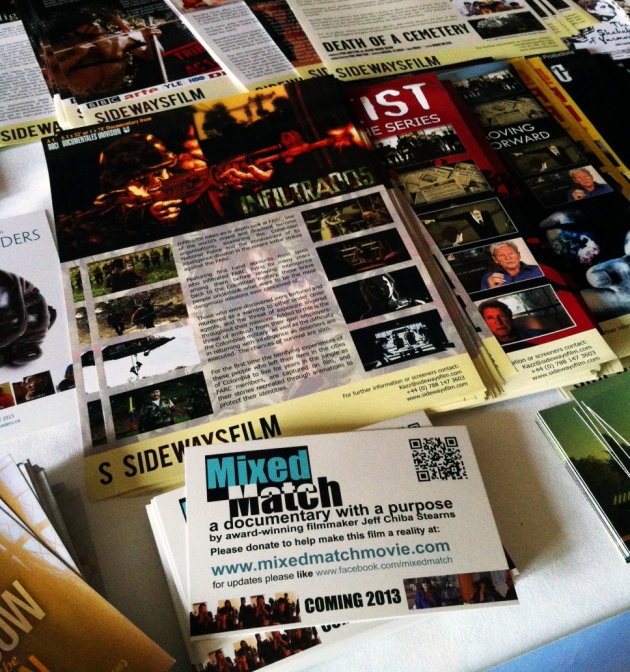
This is a continuation of Part 1 of 2 of Perfecting the Pitch – Hot Docs which you can read here.
While at Hot Docs this year, and participating in the Deal Maker program, our 15-minute scheduled meetings were with TVO, PBS POV, Entertainment One, Stornoway Communications, The Movie Network, and Astral Media – Canal D. I spent the first couple meetings introducing Ruth and I and getting to know the buyer. Then I spent about 10 minutes explaining the project and giving them a two-sheet proposal with treatment that also included a list of subjects. I also gave them a DVD with trailers and clips so they could get a sense of what the doc will look like. Then with the remaining time, the broadcaster or distributor reacted to the project by asking questions.
All in all, I’d say we had the most positive response from TVO and PBS POV. Since the film was in development, it didn’t fit with distributor, Entertainment One’s mandate. As well, since the film is a social issues documentary, it wasn’t a very good fit for Stornoway Communications, The Movie Network, or Astral Media who were all looking for different types of docs like crime or history themed. Sometimes you just have to realize that particular broadcasters are looking for particular things so you can’t always take the rejection personally. You will usually know right after the pitch if the buyer was interested or not.
One of the best opportunities came when I noticed that someone didn’t show up to their meeting with the Knowledge Network, a broadcaster I’ve dealt with before based in my home province of British Columbia. Murray Battle, who is in charge of independent production at the broadcaster, waved me over to fill the empty spot. This 15 minute impromptu meeting was probably one of the best meetings I would have at the festival and lead to another hour long meeting later in the week to discuss the various projects I was pitching and the possibility of me directing a short documentary for them. So it's important to keep an eye out for spontaneous opportunities!
At Hot Docs, there are thousands of other filmmakers hustling and wheelin’ ‘n dealin’. So needless to say, there’s a lot of competition. You can’t always book a meeting with a broadcaster since they might not have any space available or not have an interest in your project right away. So the only other approach to pitching to them is what I call the ‘shark attack’. The ‘shark attack’ is basically approaching a broadcaster at a networking event or party and trying to pitch them on the spot in 5 minutes. It usually ends with an awkward hand off of pitch materials like the one/two sheet, a DVD, and a business card. I had to do this with NHK, Hulu, and PBS West since they didn’t have any meeting times available. Although, in all cases, it’s very important to follow up with the broadcaster a day or two afterwards via email to remind them of your meeting and send follow up material or links to trailers and clips to keep you fresh in their mind. It’s extremely important to be active in this process because they receive hundreds of pitches and it’s easy for them to forget you if you don’t follow-up.

Lastly, perfecting the pitch is all about confidence. Since a broadcaster and distributors can get pitched by hundreds of filmmakers and producers over the course of Hot Docs it was super important to have my pitch materials organized, DVD’s of trailers/clips on hand, and a quick well rehearsed spiel. When you approach a buyer, they usually already have their defenses up before you even get a chance to talk to them so they’ll hit you with some tough questions right off the bat. If you can’t answer them back confidently, you’ll get frazzled and crash and burn quickly. Once you crash and burn, it's game over, the buyer will see you as unprepared and inexperienced. If they see you as inexperienced, how can they trust you will create a good product for them?
Practice your pitch with friends, family, strangers. It really helped that I’ve been talking about and developing Mixed Match for over a year and half. Therefore, I feel that I really have my pitch down packed and can answer any question with confidence or at least bullshit my way through it convincingly. The more you pitch the better and more comfortable you become doing it. Just remember, without creative directors and producers, these buyers wouldn't exist. They need us, don't be intimidated.
Although, if you’re just starting out, it’s really just about selling the idea that your film is unique, provocative, intriguing, and entertaining to a wide audience. When you pitch to a broadcaster, you have to convince them that it will appeal to their audience enough that they want to give you money to license the film or it is marketable enough for a distributor to want to distribute it. Remember, an acquisition commissioning editor’s job is not to say ‘YES’ but to say ‘NO’. Your job as a producer is to convince them to say yes! There’s a lot of competition out there for really a small amount of money. You have to stand out and be certain that your project is amazing and that you’re the right filmmaking team to be executing it. You’ll have a better chance of making the sale if you stay positive, don’t let rejection bring you down, persevere and most importantly believe in your project without a doubt. Happy pitching!
Please subscribe for updates on new blog postings about filmmaking tips and advice and check out the trailer for my upcoming documentary, Mixed Match, the project I was pitching at Hot Docs. Thanks!



